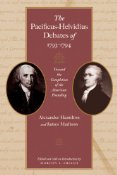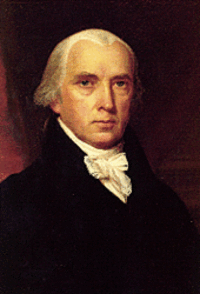
The Pacificus-Helvidius Debates of 1793-1794 Edited with an Introduction by Morton J. Frisch
The extent of executive power continues to be an issue of contention between political parties. Albeit one in which opponents sometimes swap places, depending upon who occupies the White House. As James W. Ceasar writes in Designing a Polity (reviewed here):
 During the first decade of this century, a major controversy erupted over the nature and extent of the president’s power. It centered on a claim of broad discretionary authority for the president in the conduct of foreign policy and security affairs.
…As with most disputes about institutional powers, the conflict was bound up with the conduct of a specific policy—in this case, the (George W) Bush administration’s measures during the War on Terrorism for the detention and treatment of enemy combatants and suspected terrorists and for the gathering and handling of intelligence…Â
For the most part, Republicans defended this exercise of executive power and Democrats condemned it, resurrecting the old charge of an “imperial presidency.â€Â However, that changed when the Democrats took control of the Oval Office in 2009. Although the disputed policies are often different, President Obama and the Democrats now defend the same prerogatives they condemned when exercised by President Bush.
Ceaser writes, “both sides claimed to take their bearings from the Constitution and from the intent of the Founders.â€Â Those who favored the “unitary executive†cited the vesting clause that opens Article II of the Constitution (“The Executive Power shall be vested in a President of the United States of Americaâ€) and the thought of Alexander Hamilton; those who opposed it looked to the theory of separation of powers and to James Madison’s critique of Hamilton in the Pacificus-Helvidicus debates of 1793.
 All of which is an overly long introduction to a review of the Liberty Fund edition of The Pacificus-Helvidius Debates of 1793-1794. In addition to the essays by Hamilton and James Madison, the book includes President Washington’s Neutrality Proclamation, the letter from Jefferson recruiting James Madison to challenge Hamilton’s interpretation of executive power, and an introduction by Professor Morton J. Frisch, who provides historical context.
All of which is an overly long introduction to a review of the Liberty Fund edition of The Pacificus-Helvidius Debates of 1793-1794. In addition to the essays by Hamilton and James Madison, the book includes President Washington’s Neutrality Proclamation, the letter from Jefferson recruiting James Madison to challenge Hamilton’s interpretation of executive power, and an introduction by Professor Morton J. Frisch, who provides historical context.
Frisch states in the Introduction, “The Constitutional Convention had left largely undefined the precise manner in which legislative and executive authorities would share their divided responsibilities in the conduct of foreign relations; furthermore, the relations between executive power and republican government was not fully thought through and hence not completely worked out at that time.â€
The specific issue that brought the issue to the forefront and divided the debaters was whether President George Washington had constitutional authority for unilaterally (without congressional approval) issuing a Proclamation of Neutrality following the outbreak of the French Revolutionary Wars. The United States had signed a Treaty of Alliance and a Treaty of Amity and Commerce with France dating from the Revolutionary War. (It should be noted that Washington diplomatically avoided using the word “neutrality†in the Proclamation.)
 Madison/Jefferson thought Hamilton’s arguments justified a dangerous expansion of executive power unwarranted by the Constitution. Madison insisted that Congress, not the president, had authority over foreign affairs except those areas specified in the Constitution. Writing under the name “Helvidius,” Madison attacked Federalists, and Hamilton in particular, as secret monarchists, among other uncomplimentary appellations.
Madison/Jefferson thought Hamilton’s arguments justified a dangerous expansion of executive power unwarranted by the Constitution. Madison insisted that Congress, not the president, had authority over foreign affairs except those areas specified in the Constitution. Writing under the name “Helvidius,” Madison attacked Federalists, and Hamilton in particular, as secret monarchists, among other uncomplimentary appellations.
What makes this little book even more interesting is that Hamilton and Madison, former collaborators in writing the Federalist Papers, engaged in such a rancorous debate.
Hamilton, writing as Pacificus, refers to critics of the Neutrality Proclamation as men motivated “by infatuation or depravity or both†whose “Insidious and ruination machinations†must be guarded against. In fact, his initial essay, “Defense of the President’s Neutrality Proclamation,†is mostly devoted to impugning the motives of Washington’s critics.
Madison, no piker when it came to invective, begins Helvidius Number 1 by calling all who agreed with Pacificus “foreigners and degenerate citizens.â€Â He also, one must assume, took some pleasure in quoting Hamilton against Hamilton by citing Federalist 75 in which Hamilton supported the joint participation of legislature and executive in the matter of treaties.
 However, as Pacificus, Hamilton argued that the Proclamation was constitutional because Article II vests all Executive power in the President of the United States subject only to the exceptions and qualifications stated in the Constitution. Although Congress had the right to declare War it is “the duty of the executive to preserve peace till war is declared.” Hamilton further stated,
However, as Pacificus, Hamilton argued that the Proclamation was constitutional because Article II vests all Executive power in the President of the United States subject only to the exceptions and qualifications stated in the Constitution. Although Congress had the right to declare War it is “the duty of the executive to preserve peace till war is declared.” Hamilton further stated,
The Executive is charged with the execution of all laws, the laws of Nations as well as the Municipal law, which recognizes and adopts those laws. It is consequently bound, by faithfully executing the laws of neutrality, when that is the state of the Nations, to avoid giving a cause of war to foreign Powers.â€Â Thus, he contends, “the issuance of a proclamation of neutrality is merely an Executive Act†because though treaties can only be made by the President and Senate, their activity may be continued or suspended by the President alone.
Madison argues the opposite interpretation, writing that Hamilton’s justification of the Neutrality Proclamation constituted an infringement on legislative power, foreclosing Congresses power to wage war or not, which the Constitution clearly reserves to Congress. He wrote in part,
As the Constitution has not permitted the executive singly to conclude or judge that peace ought to be made, it might be inferred from that circumstance alone, that it never meant to give it authority, singly, to judge that war ought not to be made.
Madison also supplies insight into the thinking behind the constitutional provision that gave the power to declare war to the Legislature and not the Executive.
In the Introduction, Frisch points out that the Founders avoided the inflexibility of most written Constitutions by providing general principles of governance, but not elaborating on certain specifics. He credits the debates for clarifying the constitutional principles that are now associated with executive power.
Those interested in enlarging their understanding of the Constitution can ascertain what those powers are by reading this fascinating book. Liberty Fund has performed a great service by bringing together, for the first time, all the documents relevant to the Debates in a single, readable volume.
 The posts are coming!
The posts are coming!


0 comments
Kick things off by filling out the form below.
Leave a Comment